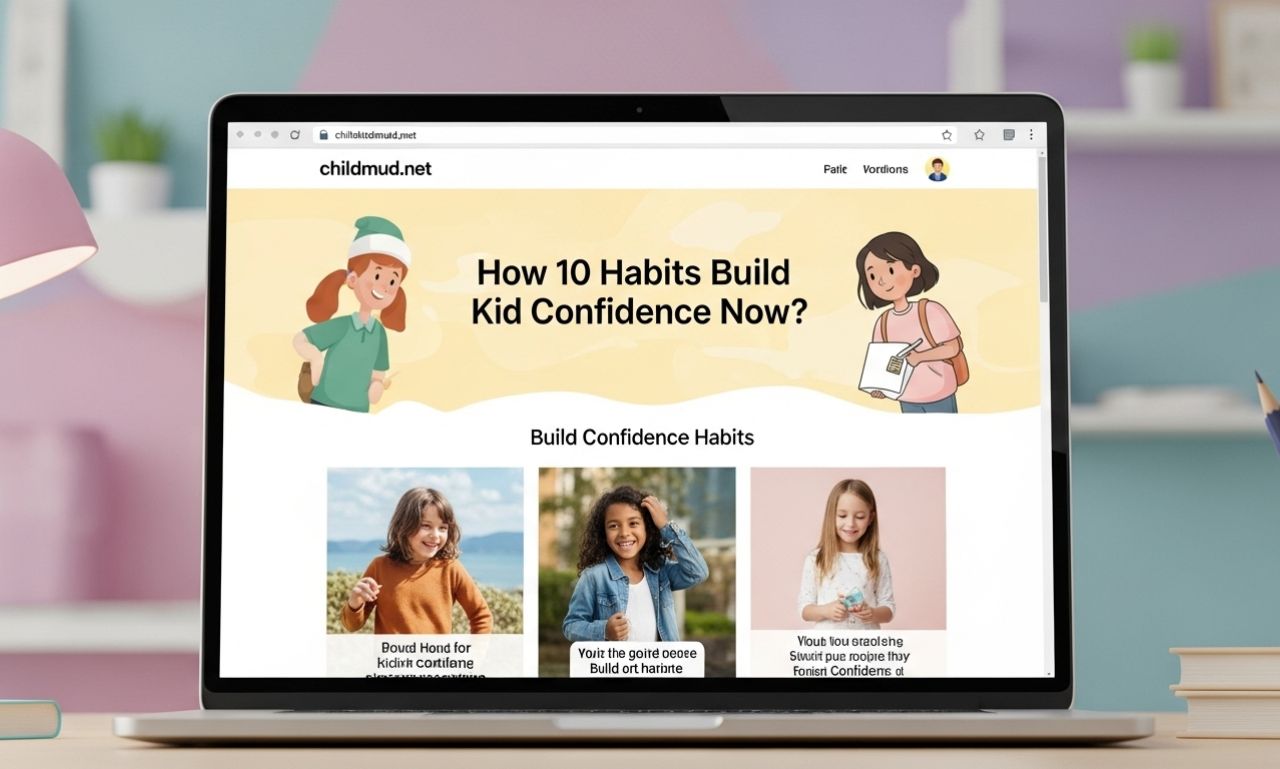Confidence is a trait that shapes how children see themselves and the world around them. A confident child (childmud.net) is more likely to tackle challenges, build meaningful relationships, and grow into a resilient adult. Yet many parents struggle with actionable steps to nurture this invaluable trait.
At childmud.net, we’re dedicated to empowering families with insightful parenting advice. That’s why we’ve created this guide to 10 practical habits that can help instill confidence in children. These habits, grounded in expert insights and real-life examples, can serve as a roadmap for parents seeking to foster a confident mindset in their child.
Why Confidence Is Key for a Child’s Development
Confidence is not just about feeling good; it’s about feeling capable. It affects a child’s emotional, social, and academic development in profound ways. Research links confidence to better problem-solving skills, stronger resilience, and an increased willingness to explore new opportunities.
Confident children are more likely to take healthy risks, handle setbacks with grace, and form meaningful connections with others. Whether it’s adapting to a new classroom environment or bouncing back from a failed test, confidence equips kids with the mental tools to thrive in a dynamic world.
Now, how can you, as a parent, actively cultivate this vital quality? By weaving confidence-building habits into their daily routine.
10 Habits That Instill Confidence in Kids
1. Developing Positive Self-Talk
The way kids talk to themselves plays a big role in shaping their confidence. Encourage positive self-talk by introducing affirmations like, “I can do hard things” or “Mistakes help me learn and grow.”
Actionable Tip
Start a daily gratitude journal with your child. Each day, they can note one thing they did well and one thing they’re grateful for, reinforcing positivity.
2. Encouraging Independence
Giving kids the freedom to make choices and take on responsibilities fosters a sense of accomplishment. Whether it’s packing their school bag or picking out their clothes, small acts of independence can go a long way.
Actionable Tip
Gradually increase responsibilities with age. For younger kids, this might mean setting the table; for older ones, it could involve managing their school schedules.
3. Setting Achievable Goals
Goal-setting teaches children the value of hard work and gives them a sense of accomplishment. Use the SMART (Specific, Measurable, Achievable, Relevant, Time-Bound) method to guide goal-setting.
Example
Instead of setting vague goals like “do better in school,” help your child aim for something specific, like “complete all homework by 6 PM every weekday.”
4. Teaching Resilience Through Failure
Failure is a natural part of life, and teaching kids to handle it fosters resilience. Shift their mindset by focusing on effort rather than outcomes.
Actionable Tip
Share stories of famous individuals who succeeded after failure, like Thomas Edison or Michael Jordan. These examples can inspire a growth mindset.
5. Modeling Confidence
Children look to their parents for cues on how to behave. When you model confidence by tackling challenges with a positive attitude, they are likely to emulate that behavior.
Actionable Tip
Refrain from self-critical statements like “I’m so bad at this” and replace them with self-empowering ones like “I’ll get better with practice.”
6. Praising Effort Over Results
While accomplishments are worth celebrating, focusing praise on effort encourages a love for learning and perseverance.
Example
Instead of saying, “Good job on winning the trophy,” try “I’m so proud of the hard work and dedication you put into getting there.”
7. Promoting Problem-Solving Skills
When kids learn to solve problems on their own, they build confidence in their abilities. Encourage them to brainstorm solutions before stepping in.
Example
For minor sibling conflicts, guide them to resolve disputes by asking questions like, “How can we work this out so that everyone feels heard?”
8. Encouraging Team Activities
Team activities like group projects or sports are excellent for teaching cooperation, communication, and leadership skills.
Suggestions
Try enrolling your child in activities like soccer leagues, art classes, or student clubs. These settings build a sense of camaraderie and mutual accomplishment.
9. Cultivating Healthy Friendships
Positive friendships can significantly boost a child’s self-esteem. Help your child recognize traits of a good friend, like kindness and respect.
Actionable Tip
Role-play peer scenarios with your child, teaching them how to stand up for themselves or handle disagreements constructively.
10. Supporting New Experiences and Challenges
Encourage kids to step out of their comfort zones. Trying new experiences builds adaptability and provides a sense of achievement.
Example
Invite your child to try a new hobby, like learning an instrument or volunteering. Support them by practicing together or breaking the new activity into manageable steps.
How childmud.net Supports Parents in Building Confident Kids
At childmud.net, we’re committed to making parenting journeys smoother and more fulfilling. Our platform offers a wealth of resources to help you raise confident, well-rounded children.
From expert-written guides on child development to creative family activities, you’ll find practical tips to raise stronger, happier kids.
Recommended Reads
- Exploring the Impact of Different Play Types on Child Development
- Understanding Child Development Stage Milestones
Subscribe to our newsletter for more actionable parenting advice delivered straight to your inbox.
childmud.net: Start Building Confidence Today
Raising confident kids may seem daunting, but it’s achievable through consistent, thoughtful habits. Remember, confidence isn’t innate; it’s cultivated through support, encouragement, and effort.
Start with just one habit from this list and incorporate it into your child’s routine. You’ll be amazed at the progress they make over time.
Watching them grow into resilient, self-assured individuals is one of parenting’s greatest rewards. For more resources on building confidence in kids, visit childmud.net and explore our comprehensive parenting guides.
